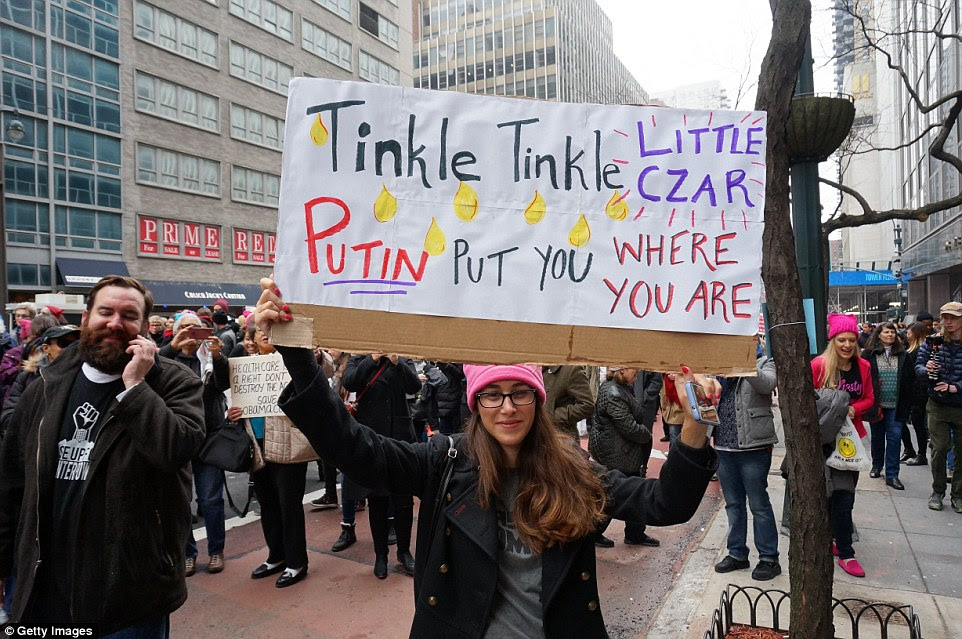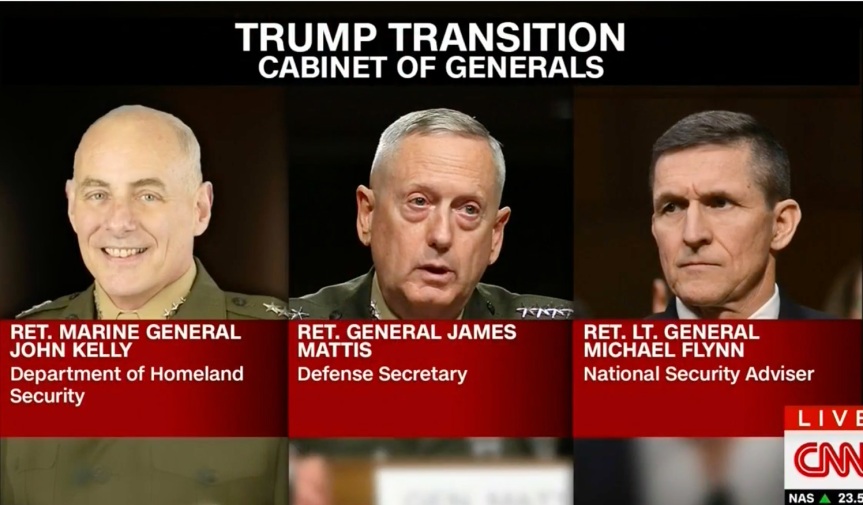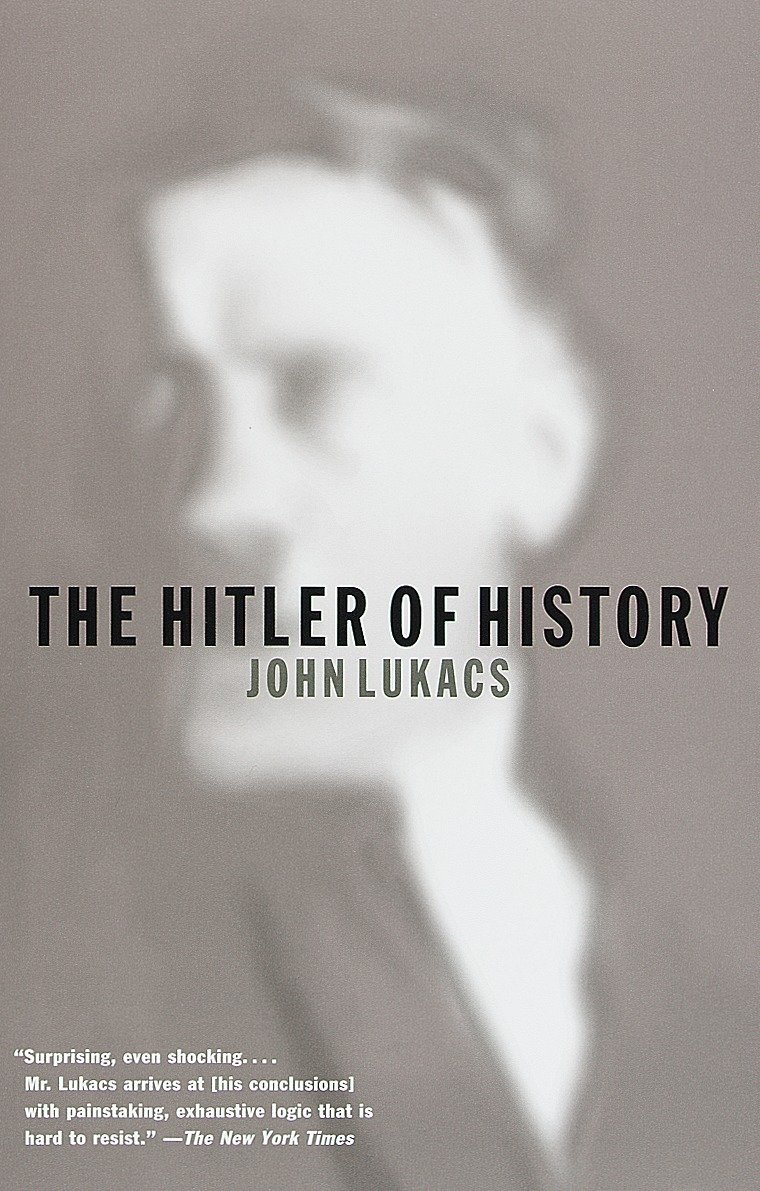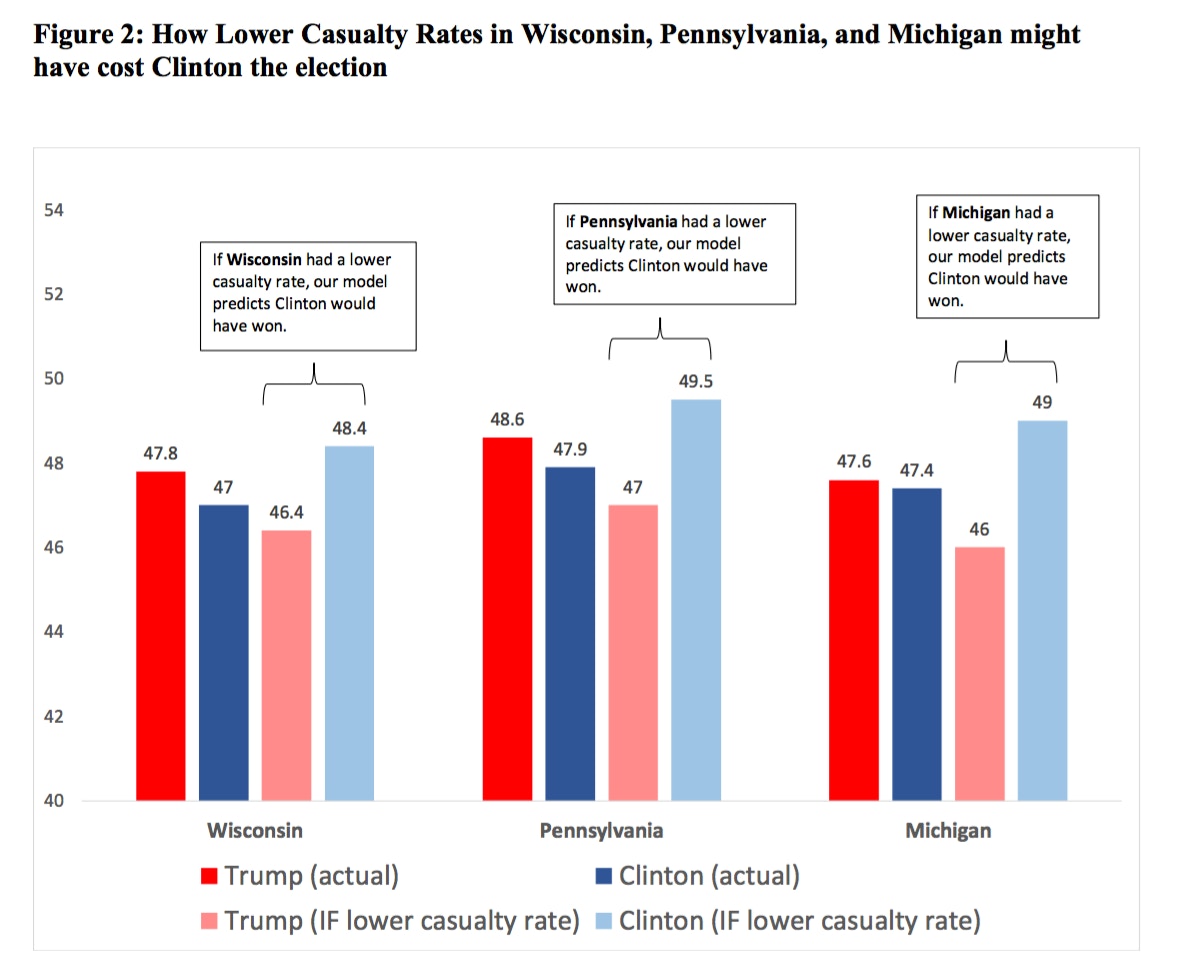Michael Murry
Democrats need an honest post-mortem – not dishonest scapegoating – in the aftermath of their devastating 2016 defeat.
Transferred nationalism, like the use of scapegoats, is a way of attaining salvation without altering one’s conduct. – George Orwell, “Notes on Nationalism” (London: Polemic, 1945)
Many have written about the recent Women’s March in Washington, D.C. — and in other cities across the United States – which occurred in response to President Donald Trump’s early executive orders, cabinet appointments, in-your-face culture-war media-baiting, and (of course) his signature late-night twitter trolling. Lots of things to legitimately oppose and protest, surely, but to my knowledge, few of these articles have analyzed the women-led protest marches from the standpoint of exculpatory political scapegoating, if not transferred nationalism, as George Orwell explained the meaning of that term in his famous essay. For my part, I would like to try and address this imbalance.
First off, several signs that I saw from the Women’s March addressed President Donald Trump personally in terms that I had difficulty connecting with Women’s Rights, such as I understand them. I don’t have a problem with either the imagery or the language, however crude or even profane, since Donald Trump himself seems to delight in offending as many persons, nations, and institutions as he possibly can if it serves his purposes. So, if he receives rough treatment, in picture or word, then he has it coming. He gets no sympathy from me. My problem with these signs stems not from their tone of deserved disrespect, but from their strange fixation on Russia and Russian President Vladimir Putin who – as far as I can tell – has no power to deny an American woman equal pay, access to a safe abortion, maternity leave, or quality public education for her children, among other issues that women – as women – typically consider important.
For example, take the following piece of work, a pointed paraphrase of an old children’s nursery rhyme:

I saw other signs of a similar nature, another of which I will cite later as a further example. I cannot speak to the generality of such sentiments, and I would hope that only a few persons harbor them, but this unfortunate expression of malignant partisan irrelevancy immediately gets to the point raised by Robert Parry in an article he wrote for Consortium News (February 1, 2017): namely, “Dangers of Democratic Putin-Bashing – Exclusive: As national Democratic leaders continue to blame Russian President Putin for their 2016 defeat, they’re leading their party into a realignment with the neocons and other war hawks.”
While I concur with Mr. Parry’s article in the main, I have to disagree with his use of the present progressive tense and the word “realignment.” As a matter of fact, the alignment of the Democratic Party with “neocons and other war hawks” took place decades ago, with President Bill Clinton. President Barack Obama and the hapless Democrats in Congress, for their part, have only reinforced and strengthened this alignment. To speak of this dreadful reality as if it exists only as a possible development in the future rather misstates the truly grim and long-established reality. Otherwise, and specifically as this article relates to the Women’s March, consider a comment I came across in response to Robert Parry’s article:
“evelync”
February 1, 2017 at 11:35 am
I have to admit that I was unable to drag myself to the women’s march because I was unsettled by the concern that it was being used, perhaps, to try to keep Hillary Clinton’s foot in the door.
Another commenter wrote:
“D5-5”
February 1, 2017 at 2:15 pm
I don’t know that having allowed themselves to sink into the behaviors employed to knock off [Senator Bernie] Sanders, then expanding these to Russia-bashing, as the Dems and Clinton did, will likely take them in the direction of an ‘oh, let’s get honest here and see why we lost the election, and straighten ourselves right out to become an actually decent alternative to offer to the American people.’
Two points here:
(1) Why not blame the Democratic Party and its deeply unpopular, demonstrably inept, largely unaccomplished, and repeatedly discredited candidate, You-Know-Her [Hillary Clinton], for losing instead of crediting the political rookie Donald Trump – and by extension, Russian President Vladimir Putin – for “winning”?
(2) Why not insist that the losing Democrats conduct a long-overdue autopsy, summarily purge their Wall-Street/Permanent-War “leadership” (the names Clinton and Obama come to mind here), and reform themselves into a truly working-class, anti-war party capable of winning back the loyalty of those impoverished Americans whom they have betrayed and abandoned for Ivy-League University degrees and swell vacations on Martha’s Vineyard with other newly rich members of their privileged “professional” class?
But attaining emotional salvation through scapegoating – so as not to require actually doing anything to cure the real political and economic disease of neoliberalism – does seem the order of the day among these marchers, most of whom one must suppose voted for You-Know-Her and the neoliberal status quo that downwardly dropping American workers hate with an abiding and vengeful passion. The Damsel of Distress has done it again, snatching defeat from the jaws of victory as only a “New Democrat” named Clinton could manage. How that must hurt!
Moving right along, I came across another image from the Women’s March that showed a man holding a mask of Vladimir Putin in front of his face while holding what looked like marionette strings from which dangled the image of Donald Trump as a puppet.

Now, I know You-Know-Her openly called Donald Trump a “puppet” of Vladimir Putin during one of the fall campaign debates, so it does not surprise me that some of her partisan supporters would credulously accept this gratuitous slur without bothering to think through the preposterous illogic behind it. For as those who have read the WikiLeaks documents have explained, the Clinton campaign tried everything they could to promote the candidacy of Donald Trump on the theory that he would make the weakest opponent, one whom You-Know-Her would have the least trouble vanquishing. Consider the following excerpt from the article “They Always Wanted Trump: Inside Team Clinton’s year-long struggle to find a strategy against the opponent they were most eager to face”, by Gabriel Debenedetti, Politico (November 07, 2016):
Clinton’s team drew up a plan to pump Trump up. Shortly after her kickoff, top aides organized a strategy call, whose agenda included a memo to the Democratic National Committee: “This memo is intended to outline the strategy and goals a potential Hillary Clinton presidential campaign would have regarding the 2016 Republican presidential field,” it read.
“The variety of candidates is a positive here, and many of the lesser known can serve as a cudgel to move the more established candidates further to the right. In this scenario, we don’t want to marginalize the more extreme candidates, but make them more ‘Pied Piper’ candidates who actually represent the mainstream of the Republican Party,” read the memo.
“Pied Piper candidates include, but aren’t limited to: Ted Cruz, Donald Trump, Ben Carson
We need to be elevating the Pied Piper candidates so that they are leaders of the pack and tell the press to [take] them seriously.”
Now, aside from the arrogant (but not implausible) notion that You-Know-Her’s campaign could tell [as in, “command”] the press whom to take seriously, no one has ever questioned the accuracy of these memoranda from John Podesta to You-Know-Her’s campaign. But just consider what they tell us.
First, if Donald Trump owed his candidacy to You-Know-Her’s campaign to promote him as a Pied Piper over all the other Republican candidates, and if Russian President Vladimir Putin somehow contrived to make all this happen, then that would credit Vladimir Putin with first manipulating one puppet, You-Know-Her, to control Trump, another puppet. In the interest of metaphorical accuracy, then, the marching protester here should have worn a Putin mask while holding the strings to a puppet of You-Know-Her holding the strings to another puppet, All-About-Him [Trump].
Second, if President Putin had successfully pulled off this convoluted manipulation of both presidential candidates, then why would he possibly let that fact come to light in these WikiLeaks memos? Wouldn’t he want to keep his sinister Machiavellian machinations a secret, so as not – as America’s CIA spooks like to say – reveal his “sources and methods”? As a former KGB intelligence officer, surely he knows his espionage tradecraft better than that. So, logically, President Putin would have no interest in revealing his omnipotent control of America’s two hapless presidential candidates. It makes no sense that Russia would leak anything about this to WikiLeaks or any other journalistic source. That would only discredit Trump as a dupe of both You-Know-Her and Vladimir Putin.
Complete bullshit, either way. It would appear that – in truth – John Podesta and You-Know-Her got just the opponent they wanted to run against: Donald Trump. Then they lost to their own “Pied Piper” puppet. But still they want to scapegoat Russian President Vladimir Putin for their own manifest failure to recognize and respond to the seething desperation of America’s working class. The people want jobs and incomes, not more NAFTA or TPP trade deals. You-Know-Her promised more of the latter. Trump promised at least some of the former. Gee whiz. Who could have ever figured out which way that “choice” would go?
Not that Republican Donald Trump will necessarily deliver anything more than tax cuts and deregulation to the Corporate Oligarchy while shoveling loads of crappy culture war to the proles who voted for him, but sheer luck, some media-sense, and good timing have given him the chance. I seriously doubt that he has the knowledge and competence to pull off anything resembling PEACE, but he does now have that opportunity. Who knows if he has the wit to seize it?
At any rate, it appears as if the defeated Democrats have chosen Russian President Putin as an attractive scapegoat simply due to (1) his “foreignness” and (2) the nature of transferred nationalism. This psychological transference, Orwell wrote, “has an important function. … It makes it possible for [the nationalist] to be much more nationalistic – more vulgar, more silly, more malignant, more dishonest – than he [or she] could ever be on behalf of [their] native country, or any unit of which [they] had real knowledge.”
Americans know little, if anything, about the Russian Federation or its duly elected, competent, domestically popular, and internationally respected president. Creative costumes and too-clever-by-half slogans aside, it seems like a monumental waste of time, energy, and limited American attention span for the Democrats to scapegoat President Putin for their own stupidity, arrogance, and insensitivity to their party’s traditional base.
The Democrats had better look inward and get their own act together. Either that, or get another goat.
Michael Murry is a Vietnam Veteran, gargoyle sculptor, and poet. A loyal correspondent to Bracing Views, he is also a contributor to The Contrary Perspective.













